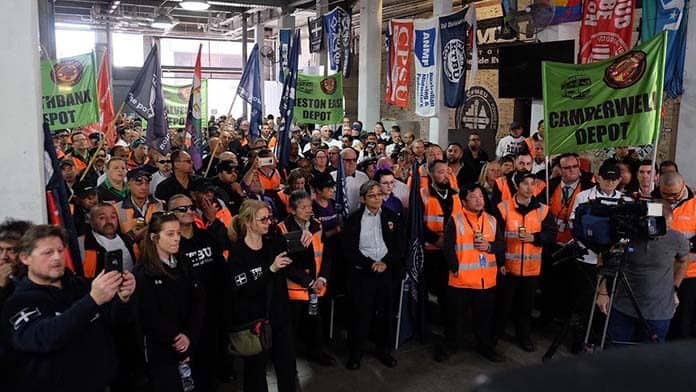Workers at Yarra Trams and Metro Trains in Melbourne are fighting private operators who want to increase casualisation and deny workers the right to strike.
RTBU members are asking for 5 per cent annual wage rises over three years. Yarra Trams has offered only 3 per cent a year. They also want to increase the number of part-time workers from 4 per cent to 15 per cent.
After two four-hour strikes their union, the RTBU, called off a planned 10 October strike despite 99.4 per cent of members voting for it. Yarra Trams CEO Nicolas Gindt asked the union to withdraw the strike, “in light of safety concerns around planned [Extinction Rebellion] protests”. The union should never have accepted this ruse, which undermined their strike campaign and risked driving a wedge between the union and climate activists.
Metro Trains has offered a 2 per cent pay increase and has also proposed measures that would undermine job security and increase casualisation. It has used legal manouevers to stop train workers taking protected industrial action in the form of fare free days.
In an appalling decision in August the Federal Court banned the action and instructed the union to pay for expensive ads on both Saturday and Sunday in newspapers notifying the public. The union should have defied the order—but unfortunately it called off the action.
Metro lawyers now say the union breached the Federal Court order by not placing the ads in time, and that any further industrial action will be unprotected. A four-hour strike planned for 27 August was also called off after the union cited progress in bargaining.
Last year Sydney trains workers were banned from striking completely because of the potential “damage to the economy”. The RTBU is returning to court seeking, “to clear away the uncertainty about whether we can take protected industrial action.”
The union wrote to the Andrews Labor State Government urging it to intervene in the court case on the side of workers’ right to strike, but Industrial Relations Minister (and former ACTU assistant secretary) Tim Pallas has refused.
Victorian Trades Hall Secretary Luke Hilakari rightly said, “We like for the government to walk beside us at ‘Change The Rules’ rallies but part of the rules that need changing are the ones that limit workers’ rights for industrial action.”
Despite failing to meet performance targets, Metro received a 20 per cent increase of $164 million per year under its contract in 2017. Metro’s parent company reported a global 14 per cent revenue increase, listing Melbourne as the key driver.
As the RTBU points out, the state government is Metro’s sole contractor. The $768 million per year the government’s pays Metro comes with no requirement to protect workers’ rights or conditions. Privatisation is an expensive sham that allows the State Government to undermine workers’ rights one step removed.
The RTBU has called a rally against Metro trains for 17 October. All supporters should attend. But without the right to strike, the RTBU has no real bargaining power. What is really needed is to step up industrial action. Joint strike action by tram and train workers could shut down Melbourne’s public transport system, and defy the attack on workers’ right to strike.






